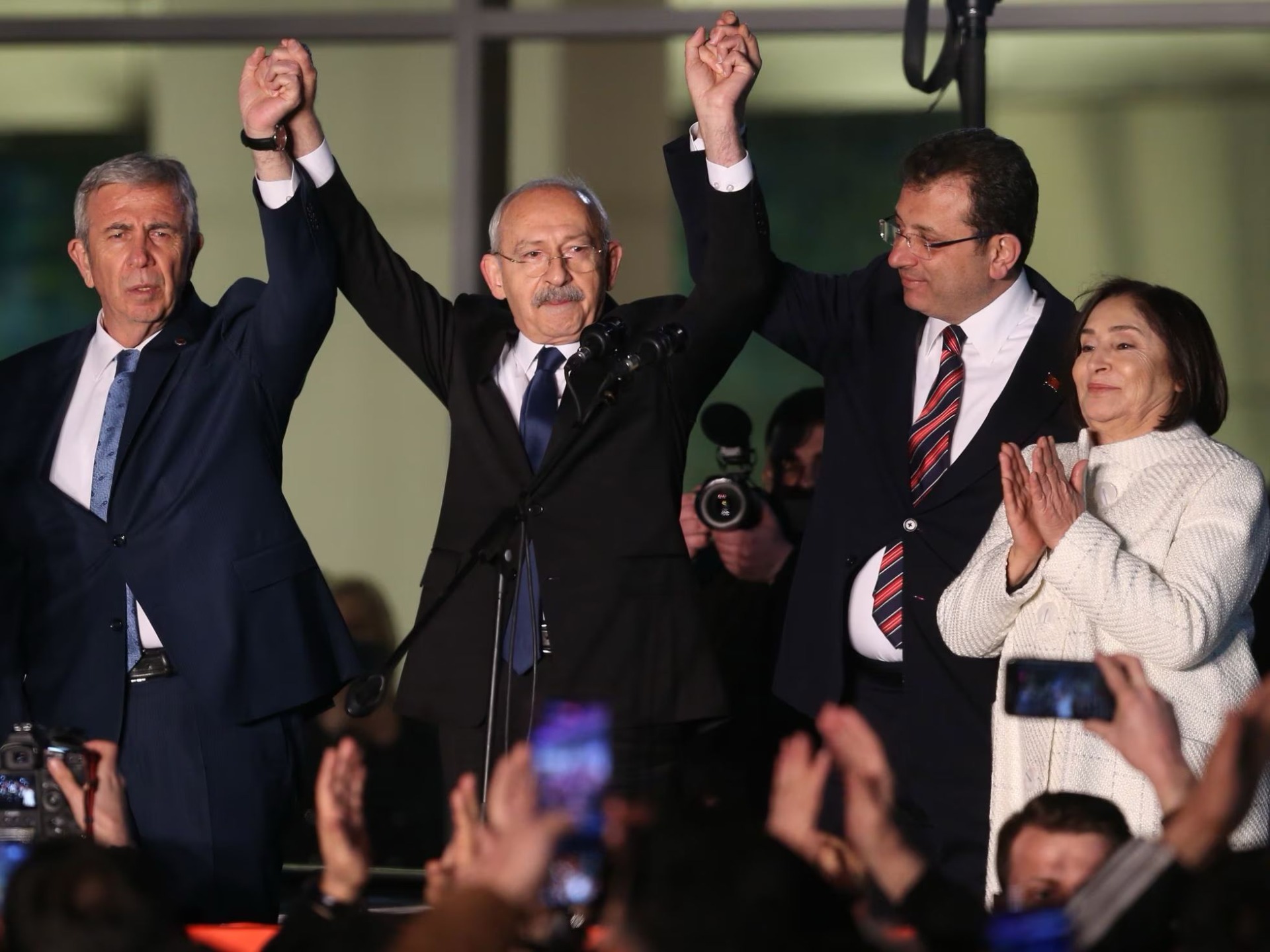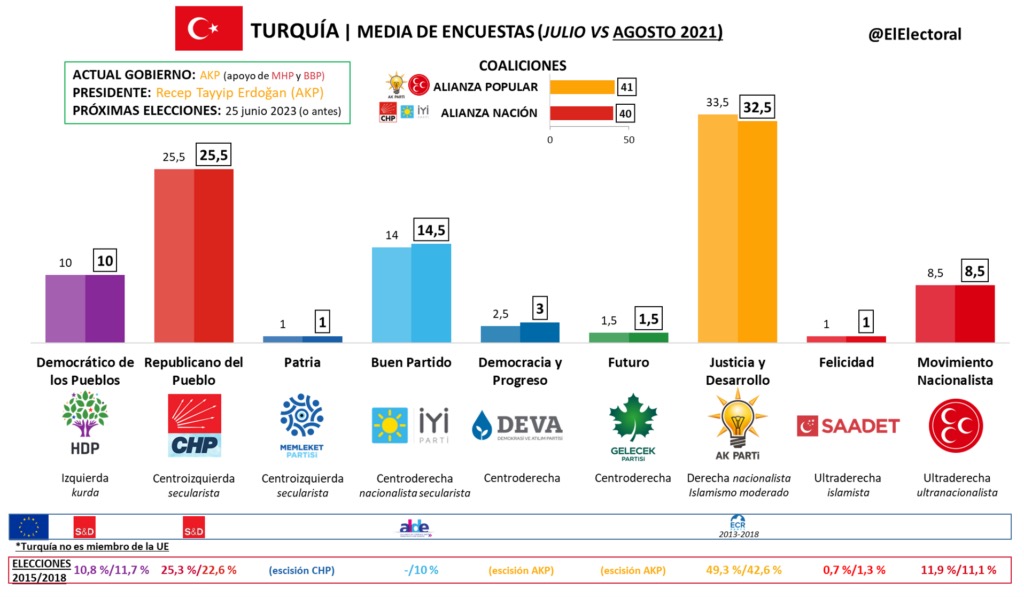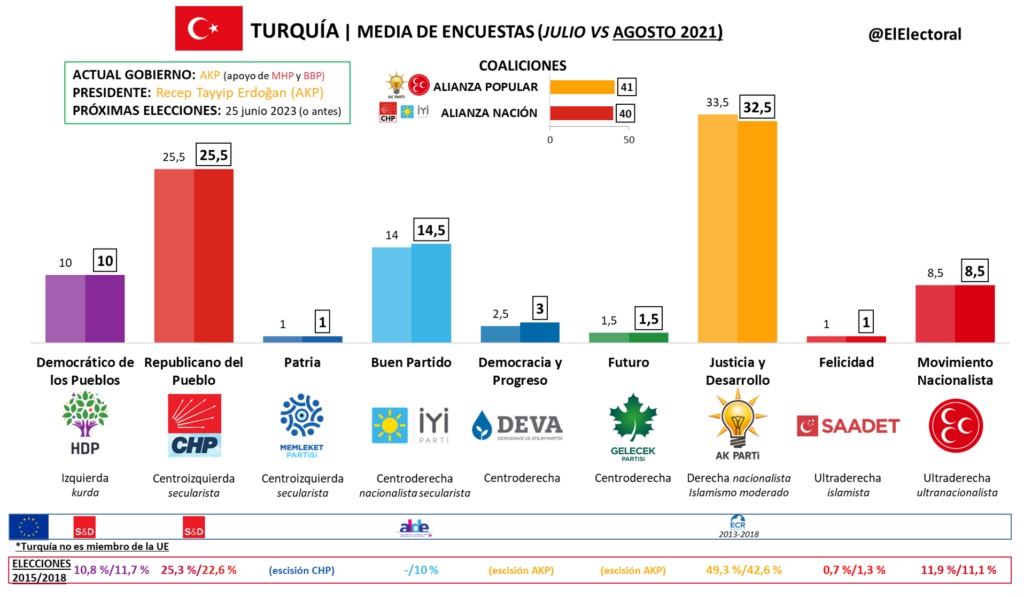Elecciones 2023: Turquía se prepara para las elecciones más decisivas en décadas
Por María García

"Turquía se enfrenta a estas elecciones sumida en una grave crisis económica y siendo pieza
central del tablero geopolítico de la región. Hemos hablado con 30 personas de diferentes
edades y diferentes partes del país para conocer cómo se sienten y cuáles son sus
expectativas a corto y largo plazo."
El próximo 14 de mayo está previsto que los votantes turcos acudan a las urnas. El presidente Recep Tayyip Erdoğan se enfrentará entonces a la mayor prueba de sus 20 años de gobierno. Unas elecciones históricas en las que se decidirá mucho más que quien dirigirá el país en los próximos años. Sobre la mesa están, entre otros, asuntos tan decisivos como la economía nacional o el papel que Turquía puede desempeñar en el panorama internacional.
En la oposición a la presidencia actual se encuentran dos partidos: el Cumhuriyet Halk Partisi (CHP) y el İyi Parti, que se presentan a las elecciones aliados con partidos más pequeños (entre los que se presupone un papel clave de la minoría kurda del país) con el objetivo de evitar el afianzamiento definitivo de Erdogan. Prometen,entre otras cosas, devolver la independencia al banco central, revertir las políticas económicas de Erdoğan, o volver al anterior sistema parlamentario en caso de conseguir la victoria electoral. Son estos dos partidos, en coalición como "Alianza Nación", los que podrían enfrentarse a la "Alianza Popular" integrada por Adalet ve Kalkınma Partisi (AKP), Milliyetçi Hareket Partisi (MHP) y otras formaciones minoritarias.
Turquía se enfrenta a estas elecciones sumida en una grave crisis económica y siendo pieza central del tablero geopolítico de la región. Hemos hablado con 30 personas de diferentes edades y diferentes partes del país para conocer cómo se sienten y cuáles son sus expectativas a corto y largo plazo. ¿Por qué son tan importantes estas elecciones? ¿Qué las diferencia de las celebradas en las últimas dos décadas?
Por una parte, en esta ocasión no se está produciendo propaganda masiva a favor del actual presidente (normalmente suele comenzar hasta seis meses antes de la fecha electoral) lo que, si bien puede ser un resultado de las recientes catástrofes naturales que se han producido en el país en los últimos meses, no deja de resultar significativo de cara a posibles resultados.
Los terremotos y las inundaciones están en el centro del argumentario político y está teniendo gran efecto en ambas partes.
A raíz de estos desastres la población se ha vuelto cada vez menos tolerante ante las acciones del gobierno. Existe cada vez una mayor concienciación en lo que respecta a la fuerte corrupción que existe en las instituciones, por ejemplo en relación con el dinero recaudado a través de canales públicos y que no ha llegado a su destino.
Expertos como Naci Görür o Celâl Şengö han argumentado acerca del conocimiento previo y los avisos que se han dado al gobierno durante años de que Turquía es un país activo en terremotos y la necesidad de construir edificios capaces de hacer frente a un posible seísmo. Y aunque no se ha dado una respuesta clara por parte de las autoridades, el tema ha sido llevado al congreso por parte de parlamentarios como Garo Paylan y a la opinión pública por el periodista İsmail Saymaz.
Las personas entrevistadas en este artículo coinciden en señalar la tendencia a utilizar los terremotos como excusa y que en esta campaña electoral se están centrando más en la oposición que en el propio Erdoğan, que está un poco en la sombra.
Este año se cumplen 100 años de la fundación de la República y los turcos sienten que en este momento siguen luchando por sus derechos como lo hacían en ese momento. La gran mayoría comparte el sentimiento de que estas elecciones son diferentes porque, dicen, "tener esperanza de que esta vez sí van a haber cambios significativos".
Por otra parte están las personas que piensan que ese sentimiento positivo y de ilusión siempre ha existido pero la realidad es que nunca se ha llegado a producir. La prensa y las principales encuestas exponen que en estas elecciones el factor que une a la población es más el anti-erdoğanismo, que apoyar a la coalición que se presenta como oposición. Por parte de los medios internacionales se es más pesimista y se da por descontado que Erdoğan volverá a ganar las elecciones, ya que no se cree que se vayan a llevar a cabo unas votaciones limpias y sin trampas.
Se destaca que países como Rusia, Arabia Saudi o Emiratos Árabes están apoyando activamente al candidato e inyectando grandes sumas de dinero en la economía turca, dinero que no llega a las personas que de verdad lo necesitan pero que ayuda a frenar los efectos devastadores de la política de tasas de interés bajas de Erdoğan.
Las primeras encuestas realizadas desde los seísmos apuntaban a que Erdoğan era capaz de mantener en gran medida su apoyo a pesar de la catástrofe. Pero la aparición de una oposición unida, incluso después de un retraso en la elección de su candidato, podría suponer un reto mayor para él, según los analistas.
Encuestas preliminares muestran datos que, aunque
pueden no ser del todo realistas, coinciden en que la gran mayoría de la población (entre un
40-45%) va a seguir votando por el actual presidente y su partido, mientras que el 55%-60%
quiere un cambio de rumbo. Estos últimos no pueden creer que después de 20 años se siga
creyendo que el gobierno actual va a llevar a cabo los proyectos que prometen y no han
realizado en todo este tiempo que han tenido la oportunidad, dicen que la gente olvida el
pasado y perdona al líder con facilidad.

Por otro lado, existe una creencia extendida que las personas más jóvenes y que viven en grandes ciudades tienden más a votar a la izquierda progresista y los más mayores que viven en pequeñas ciudades o pueblos, son más conservadores.
Los votantes turcos están muy polarizados y donde mejor podemos ver estos datos reflejados es fijándonos en las elecciones autonómicas.
En gran medida, Erdoğan no consigue votos de los jóvenes, y los que le siguen ciegamente y le admiran como líder suelen ser las rentas más bajas, las personas con trabajos más precarios y con un nivel de educación por debajo de la media. El presidente de Bupar Research Company, compartió los resultados de un nuevo informe de investigación sobre jóvenes de 18 a 25 años que constituyen aproximadamente 13 millones de los 64 millones de votantes, llegando a la conclusión de que el 80% de los jóvenes votará por partidos y líderes distintos a la Alianza Popular encabezada por Erdoğan.
Las personas que prestan más atención a las redes sociales, que van a la universidad, o que viven en ciudades donde ya hay candidatos de la oposición gobernando, tienen más simpatía por estos porque viven en primera persona los cambios que se están produciendo. Por el contrario, el resto de personas simplemente prefieren seguir como están porque no conocen nada mejor, porque tienen miedo de ir a peor. De oeste a este, la gente tiende más a apoyar al gobierno, mientras que los ciudadanos occidentales están en contra.
En definitiva, el país se enfrenta a unas elecciones decisivas donde hay sobre la mesa temas de vital importancia. Quedamos a la espera de lo que suceda en los próximos meses.
"Lale devri nasıl bittiyse, sülale devri de öyle bitecek" - (Así como terminó la era de los tulipanes, también terminará la era de la dinastía).
Elections 2023: Türkiye is preparing for the most decisive elections in
decades.
"Türkiye is facing these elections plunged into a serious economic crisis and being the
centerpiece of the region's geopolitical chessboard. We have spoken with 30 people of
different ages and from different parts of the country to find out how they feel and what their
expectations are in the short and long term."
On May 14th, Turkish voters are scheduled to go to elections. President Recep Tayyip
Erdoğan will then face the biggest test of his 20-year rule. Historic elections in which much
more will be decided than who will lead the country in the upcoming years. On the table are,
among others, issues as decisive as the national economy or the role that Türkiye can play on
the international scene.
Opposing the current presidency are two parties: the Cumhuriyet Halk Partisi (CHP) and the İyi Parti, which are running in the elections allied with smaller parties (among which a key role is assumed for the Kurdish minority of the country) with the aim of avoiding the definitive consolidation of Erdoğan. They promise, among other things, to restore the independence of the central bank, to reverse Erdoğan's economic policies, or to return to the previous parliamentary system in case of electoral victory. It is these two parties, in coalition as the "Nation Alliance", which could face the "People's Alliance" made up of Adalet ve Kalkınma Partisi (AKP), Milliyetçi Hareket Partisi (MHP) and other minority formations.
Türkiye is facing these elections plunged into a serious economic crisis and is the centerpiece of the region's geopolitical chessboard. We have spoken with 30 people of different ages and from different parts of the country to find out how they feel and what their expectations are in the short and long term. Why are these elections so important? What differentiates them from those held in the last two decades?
On the one hand, this time there is no massive propaganda being produced in favor of the current president (it usually starts up to six months before the election date), which, although it may be a result of the recent natural catastrophes that have occurred in the country in recent months, is still significant with regard to possible results.
Earthquakes and floods are at the center of the political argument and it is having a great effect on both sides.
As a result of these disasters, the population has become less and less tolerant of government actions. There is increasing awareness regarding the strong corruption that exists in institutions, for example in relation to the money collected through public channels and that it has not reached its destination.
Experts such as Naci Görür or Celâl Şengö have argued about the prior knowledge and warnings that have been given to the government for years that Türkiye is an active country in earthquakes and the need to build buildings capable of dealing with a possible earthquake. And although no clear response has been given by the authorities, the issue has been brought to congress by parliamentarians such as Garo Paylan and to public opinion by journalist İsmail Saymaz.
The people interviewed in this article coincide in pointing out the tendency to use earthquakes as an excuse and that in this electoral campaign they are focusing more on the opposition than on Erdoğan himself, who is somewhat in the shadows.
This year marks the 100th anniversary of the founding of the Republic and Turks feel that at this moment they continue to fight for their rights as they did at that time. The vast majority share the feeling that these elections are different because, they say, "they have hope that this time there will be significant changes."
On the other hand, there are people who think that this positive feeling and illusion has always existed, but the reality is that it has never been produced. The press and the main polls show that in these elections the factor that unites the population is more anti-Erdoğanism than supporting the coalition that presents itself as the opposition. The international media is way more pessimistic and it is taken for granted that Erdoğan will win the elections again, since it is not believed that fair voting will take place without cheating.
It is highlighted that countries such as Russia, Saudi Arabia or the United Arab Emirates are actively supporting the candidate and injecting large sums of money into the Turkish economy, money that does not reach the people who really need it but that helps to stop the devastating effects of the Erdoğan's low interest rate policy.
Early polls since the quakes suggested that Erdoğan was able to largely maintain his support despite the catastrophe. But the emergence of a united opposition, even after a delay in choosing his candidate, could pose a bigger challenge for him, analysts say.
Preliminary surveys show data that, although they may not be entirely realistic, agree that the vast majority of the population (between 40-45%) will continue to vote for the current president and his party, while 55%-60 % want a change of course. The latter cannot believe that after 20 years they continue to believe that the current government is going to carry out the projects they promise and have not carried out in all this time that they have had the opportunity, they say that people forget the past and forgive the leader with ease.

On the other hand, there is a widespread belief that younger people who live in big cities are more likely to vote for the progressive left and older people who live in small cities or towns are more conservative.
Turkish voters are very polarized and where we can best see this data reflected is by looking at the regional elections.
To a large extent, Erdoğan does not get votes from the youth, and those who blindly follow and admire him as a leader are often the lowest income, people with the most precarious jobs and below average education level. The president of Bupar Research Company, shared the results of a new research report on young people aged 18-25 who make up approximately 13 million of the 64 million voters, concluding that 80% of young people will vote for parties and leaders other than the People's Alliance headed by Erdoğan.
People who pay more attention to social networks, who go to university, or who live in cities where there are already opposition candidates in power, have more sympathy for them because they experience first-hand the changes that are taking place. On the contrary, the rest of the people simply prefer to continue as they are because they don't know any better, because they are afraid of getting worse. From west to east, people are more likely to support the government, while western citizens are against it.
In short, the country is facing decisive elections where vitally important issues are on the table. We await what happens in the coming months.
"Lale devri nasıl bittiyse, sülale devri de öyle bitecek" - (As the tulip era ended, so will the
dynasty era)
Referencias
- https://elelectoral.com/2021/09/encuestas-elecciones-turquia-2023-erdogan-chp/
- https://elpais.com/internacional/2023-03-07/la-oposicion-turca-consensua-una-candidatura-co njunta-para-hacer-frente-a-erdogan-en-las-elecciones-de-mayo.html
- https://larazon.pe/ricardo-sanchez-serra-habra-elecciones-limpias-en-turquia/
- https://www.france24.com/es/medio-oriente/20230123-turqu%C3%ADa-elecciones-presiden ciales-y-legislativas-tendrán-lugar-el-14-de-mayo-confirma-erdogan
- https://electomania.es/endogan23a22/ https://www.youtube.com/@GencSavas